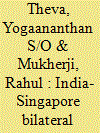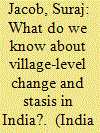| Srl | Item |
| 1 |
ID:
142261


|
|
|
|
|
| Summary/Abstract |
The International Development Association (IDA), the World Bank's facility for low-income countries, has granted India an unprecedented exception to its usual “graduation” policy—extending transitional support to its largest borrower, even though it has crossed the normal eligibility cutoff for IDA’s soft loans (based on per capita income). Before 2012, some Indian officials had called for a “graceful graduation,” believing that India did not need concessionary development assistance any longer. But with IDA graduation imminent in 2013 and facing a limit on borrowing from the Bank’s other window for middle-income countries, the International Bank for Reconstruction and Development, India successfully appealed for continued IDA access. This article draws on official interviews and documents to show how India secured post-graduation transitional support from IDA—suggesting that while India’s leaders seek to present their country as a rising power with influence in multilateral institutions, they can also be pragmatic in their status demands and quietly persuasive in their economic diplomacy.
|
|
|
|
|
|
|
|
|
|
|
|
|
|
|
|
| 2 |
ID:
142263


|
|
|
|
|
| Summary/Abstract |
This paper is a critical historical analysis of the trajectory of geo-political and economic relations between India and Singapore. This paper argues that India’s perception of its interests and its geopolitical orientation towards the Cold War prevented India’s security and economic integration with Southeast Asia. Apart from geopolitics, the economic orientation of India was also a critical factor that influenced the trajectory of India – Singapore economic engagement. However, there was a dramatic change after the Cold War ended. The structural change from bi-polarity towards a unipolar moment transformed both geopolitics and economic engagement. Moreover, India’s own economic orientation had also changed by the end of the Cold War. In sum, this paper attempts to elucidate upon how ideas construct economic and political interests and how geopolitical interests, once constructed, drive economic relations.
|
|
|
|
|
|
|
|
|
|
|
|
|
|
|
|
| 3 |
ID:
142262


|
|
|
|
|
| Summary/Abstract |
The study documents considerable spatial variation in change and stasis in development outcomes over the decade from 2001 to 2011 (proxied by women’s literacy and child sex ratio) even across villages within the same micro-region (taluk or sub-taluk) and with similar starting points. However, neither decentralization policy / practice nor other forms of public policy has identified village-level factors that mediate the impact of policy. Although extant literature has explored spatial variation, it has not explored such variation across different micro-regions of India, nor has it used methodologies that validate explanatory inference from spatial-longitudinal comparisons. The article notes that the degree of spatial variation in change over such a short period of time is remarkably similar across different micro-regions of the country. It also proposes a tentative methodology for identifying village pairs to produce more rigorous comparative longitudinal analysis of the drivers of development change and stasis.
|
|
|
|
|
|
|
|
|
|
|
|
|
|
|
|